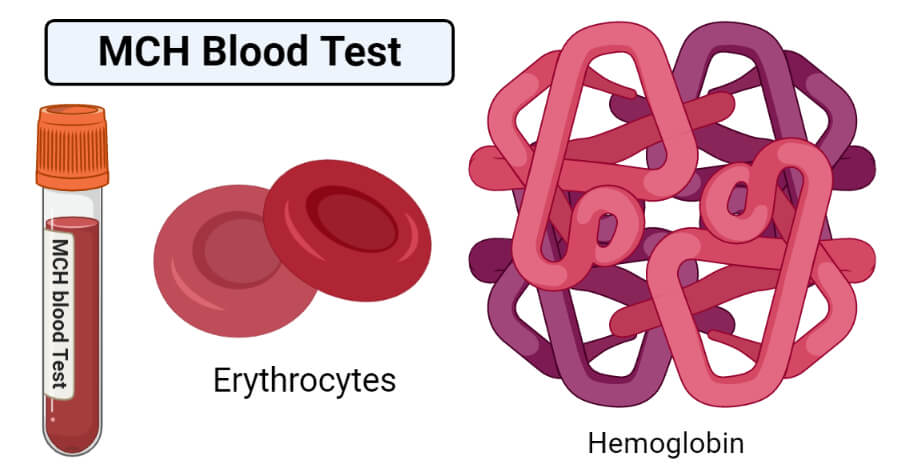Interesting Science Videos
What is MCH Blood Test?
MCH (Mean Corpuscular Haemoglobin) test is a test performed to calculate the average amount of hemoglobin present in the red blood cells of a blood sample.
- Hemoglobin is an essential protein found in the blood as it is responsible for the transport of gases and nutrients throughout the body.
- MCH is different from MCHC even though they seem like the same thing. MCH is the average amount of hemoglobin in individual red blood cells, whereas MCHC is the average weight of hemoglobin-based on the volume of red blood cells.
- The calculation of MCH is an essential part of blood tests as abnormally high, or low MCH levels indicate different types of problems in the body, ranging from lack of nutrients to chronic diseases.
- MCH testing is performed as a part of Complete Blood Count (CBC) that tests the total blood cell count, composition of blood as well as the hemoglobin component of the red blood cells.
- The average or normal value of MCH in humans remains at about 27-30 picograms/cell.
- The value of MCH, however, might differ from one individual from another as it depends on the size of the RBCs and the amount of hemoglobin present in the cells.

Calculation of MCH levels
- MCH levels are calculated during the routine blood test, along with other counts or tests.
- The MCH value is calculated by dividing the total weight of hemoglobin by the total number of red blood cells in a particular volume of the blood sample.
- This calculation gives an average concentration of hemoglobin in each red blood cell throughout the sample.
- MCH test is performed as a part of the CBC test, usually as a general test rather than to detect a particular disease.
Result interpretation of MCH blood Test
- The average or normal value of MCH in humans remains at about 27-30 picograms/cell.
- Abnormally high or low values might indicate different forms of diseases or disorders present in the body of the particular individual.
- In the case of results with higher or lower values of MCH, further investigations may be warranted.
- Abnormal results are not necessarily considered indications of serious health issues; however, in some cases, these might be significant, so it is important to rule them out.
High MCH value
- The level of MCH is considered high when the value goes over 34 pg. The most common reason behind this is macrocytic anemia.
- Macrocytic anemia is a blood disorder that occurs when the body fails to produce enough red blood cells. The red blood cells produced also are larger than their normal size, which results in a higher concentration of hemoglobin.
- Besides, higher MCH values might also result due to deficient levels of Vitamin B-12 and the lack of nutrients in the diet.
Low MCH value
- The value of MCH is considered low when the levels are below 26 pg. The most common cause of the low MCH value includes blood loss, iron deficiency, and microcytic anemia.
- Microcytic anemia is a condition in which the size of the produced red blood cells is small, thus carrying a lesser amount of hemoglobin.
- Other potential causes might include conditions like hemoglobinopathy, which causes changes in the structure of hemoglobin, resulting in iron-deficiency anemia.
References and Sources
- 4% – https://www.medicalnewstoday.com/articles/318192
- 2% – https://www.healthtestingcenters.com/what-does-high-mch-blood-test-result-mean/
- 2% – https://www.coursehero.com/file/71428676/ANEMIAdocx/
- 2% – https://en.wikipedia.org/wiki/Mean_corpuscular_hemoglobin
- 1% – https://www.medicalnewstoday.com/articles/319050
- 1% – https://www.healthline.com/health/mch
- 1% – https://labtestsonline.org/tests/red-blood-cell-count-rbc
- 1% – https://knowyourblood.com/mchc-in-blood-tests-what-does-it-mean-how-to-test-for-it/
- 1% – https://healthjade.com/mch-blood-test/
- 1% – https://en.wikipedia.org/wiki/Macrocytic_anemia
